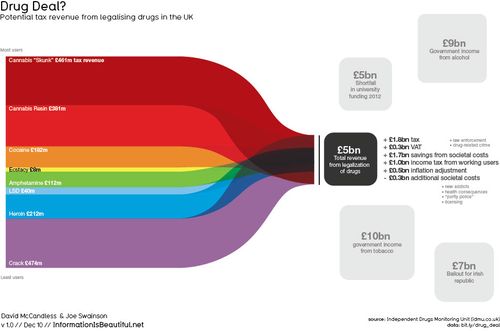 The most senior police officer in the UK, the Commissioner of the Metropolitan Police Sir Paul Stephenson no less, is saying that the British citizens are not taking the threat of terrorism seriously enough. “Al Qaeda” could strike at any minute, the enemy is within etc, etc.…
The most senior police officer in the UK, the Commissioner of the Metropolitan Police Sir Paul Stephenson no less, is saying that the British citizens are not taking the threat of terrorism seriously enough. “Al Qaeda” could strike at any minute, the enemy is within etc, etc.…
Now, for a man of his seniority, one presumes that he has served as a policeman for a fair few years — possibly in the 1970s, certainly the 80s and 90s. Which means that he should have a memory of what it means to be under the real, daily threat of bombs exploding that aimed to maim, kill and terrorize the civilian population of London and the rest of the UK. After all, throughout those decades the Provisional IRA, backed by the fund-raising activities of certain American citizens and Colonel Gaddafi of Libya — that erstwhile patron of freedom fighters everywhere, now a staunch ally of the West in the “war on terror” — was pretty much putting bombs down at will on UK streets.
 During these years the UK has endured Lockerbie, Omagh, Bishopsgate, Canary Wharf, and Manchester, to name but a few major atrocities. A good summary of the terrorist attacks against London alone over the last 150 years can be found here, with the first Tube bombing occurring in 1885. A pilot, Patrick Smith, also recently wrote a great article about aircraft security and the sheer scale of the terrorist threat to the West in the 1980s — and asks a very pertinent question: just how would we collectively react to such a stream of atrocities now?
During these years the UK has endured Lockerbie, Omagh, Bishopsgate, Canary Wharf, and Manchester, to name but a few major atrocities. A good summary of the terrorist attacks against London alone over the last 150 years can be found here, with the first Tube bombing occurring in 1885. A pilot, Patrick Smith, also recently wrote a great article about aircraft security and the sheer scale of the terrorist threat to the West in the 1980s — and asks a very pertinent question: just how would we collectively react to such a stream of atrocities now?
Putting aside my professional life at the time, I have personal memories of what it was like to live and work in London in the 1990s under the shadow of terrorism. I remember making my way to work when I was a fledging MI5 intelligence officer in 1991 and commuting through Victoria train station in London 10 minutes before a bomb, planted in a rubbish bin, exploded on the station concourse. One person was killed, and many sustained severe injuries. One person had their foot blown off — the image haunted me for a long time.
I also vividly remember, two years later, sitting at my desk in MI5’s Mayfair office, and hearing a dull thud in the background — this turned out to be a bomb exploding outside Harrods department store in Knightsbridge. And let’s not forget the almost daily disruption to the tube and rail networks during the 90s because of security alerts. Every Londoner was exhorted to watch out for, and report, any suspicious packages left at stations or on streets. Yet because of the preceding couple of decades, this was already a normal way of life in the city.
 Londoners have grown used to inconvenience; they grumble a bit about the disruption and then get on with their lives — echoes of the “keep calm and carry on” mentality that evolved during the Blitz years. In the 1990s the only noticeable change to London’s diurnal rhythm was that there were fewer US tourists clogging up the streets — an early indication of the disproportionate, paranoid US reaction to a perceived terrorist threat.
Londoners have grown used to inconvenience; they grumble a bit about the disruption and then get on with their lives — echoes of the “keep calm and carry on” mentality that evolved during the Blitz years. In the 1990s the only noticeable change to London’s diurnal rhythm was that there were fewer US tourists clogging up the streets — an early indication of the disproportionate, paranoid US reaction to a perceived terrorist threat.
Separate from the IRA, in 1994 a car bomb exploded outside the Israeli embassy in Kensington, London. Despite initial reports that Iranian-backed groups were responsible (and, it turns out, MI5 may have dropped the ball), Palestinian activists were blamed and convicted, wrongly it turns out, as MI5 assessed that the Israeli intelligence agency, Mossad, had pulled a dirty trick.
Terrorism on the streets of London was nothing new. In the early 1980s my father was in London attending an investigative journalism course and narrowly missed two bombings — one in a restaurant at Marble Arch a couple of hours after he and the rest of the course members had been eating there, and another later that night close to the hotel he was staying in at Lancaster Gate.
 My Pa had another near miss in 1970 when he was a young airline pilot flying VC-10s around the world for BOAC. He was supposed to be the pilot of the VC-10 that ended up at Dawson’s Field in Jordan — hijacked by members of the PFLP and eventually blown up. He had been prevented from flying from Bahrain that day as he was suffering a bad dose of the ‘flu.
My Pa had another near miss in 1970 when he was a young airline pilot flying VC-10s around the world for BOAC. He was supposed to be the pilot of the VC-10 that ended up at Dawson’s Field in Jordan — hijacked by members of the PFLP and eventually blown up. He had been prevented from flying from Bahrain that day as he was suffering a bad dose of the ‘flu.
To this day, his view about both these incidents is to shrug and carry on. Yes, it was a close shave, but if you allow incidents like that to colour the rest of your life, then the concept of terrorism has already won.
The UK and its citizens have had plenty of hands-on experience of living with the reality of war, political violence and terrorism. As a result, I’m constantly flabbergasted by the global security crackdown since 9/11 and particularly in the UK after 7th July 2005. It was ghastly, and my heart bleeds for the victims, families, and survivors, but major terrorist atrocities are hardly new to the UK.
 The UK government seems now to have forgotten hard-learned lessons from the 1970s and 80s in the war in Northern Ireland: that draconian measures — torture, shoot to kill, internment, military-style tribunals — not only don’t work, but also are counter-productive and act as recruiting grounds for terrorist groups. The flagrant miscarriages of justice around cases like the Guildford Four and Birmingham Six reinforced this perspective.
The UK government seems now to have forgotten hard-learned lessons from the 1970s and 80s in the war in Northern Ireland: that draconian measures — torture, shoot to kill, internment, military-style tribunals — not only don’t work, but also are counter-productive and act as recruiting grounds for terrorist groups. The flagrant miscarriages of justice around cases like the Guildford Four and Birmingham Six reinforced this perspective.
And the UK has not been alone in Europe when it comes to living with the daily reality of terrorism: the Spanish have endured Basque separatist attacks for four decades, as have the French — in addition to those perpetrated in Paris with devastating results by Algerian Islamic groups in the 1990s. Germany successfully dealt with the Baader-Meinhof Gang (Red Army Faction), and other European countries, such as Belgium and Italy, have endured Operation Gladio style terrorist attacks over recent decades.
But in all those years, none of our countries gave up on the concept of basic values and freedoms — indeed they seemed to learn useful lessons from the repressive, failed experiment in Northern Ireland. So why are we now falling in line, unthinkingly, with the hysterical and brutal US response post 9/11?
 In the UK we are effectively living under a Big Brother surveillance state, as I have previously and extensively written. Other Northern European countries are constantly pressured to fall in line with the US “war on terror” fear mentality. To its credit Germany is reacting cautiously, even in the face of the current, hyped-up terror threat. But then we Europeans know the lessons of history — we’ve lived them, and Germany more than most. The ghosts of the Gestapo and the Stasi still create a frisson of fear in the collective Germanic memory.
In the UK we are effectively living under a Big Brother surveillance state, as I have previously and extensively written. Other Northern European countries are constantly pressured to fall in line with the US “war on terror” fear mentality. To its credit Germany is reacting cautiously, even in the face of the current, hyped-up terror threat. But then we Europeans know the lessons of history — we’ve lived them, and Germany more than most. The ghosts of the Gestapo and the Stasi still create a frisson of fear in the collective Germanic memory.
But returning to that doughty crime fighter, Sir Paul Stephenson. The day after he ticked off the UK public for not taking terrorism seriously enough, he is once again in the media, predicting an era of growing civil unrest in the wake of the student riots in London, and chillingly stating that the rules of the game had changed. Forget about trying to negotiate with campaigners — now the only way to deal with them is to spy on them, as The Guardian reported:
“We have been going through a period where we have not seen that sort of violent disorder,” Stephenson said. “We had dealt with student organisers before and I think we based it too much on history. If we follow an intelligence-based model that stops you doing that. Obviously you realise the game has changed. Regrettably, the game has changed and we must act.”
 Last year the same newspaper revealed that ACPO, the senior police officers’ private association, was running an illegal unit to spy on “domestic extremists” (read politically active citizens). In response to the public outcry, the head of ACPO, Sir Hugh Orde, promised to stop this Stasi-like practice. In the wake of the student protests, Sir Paul will probably see a renewed need for the unit, no doubt under another name. Big Brother grows apace — because, of course, we all know that Oceania has always been at war with Eastasia.…..
Last year the same newspaper revealed that ACPO, the senior police officers’ private association, was running an illegal unit to spy on “domestic extremists” (read politically active citizens). In response to the public outcry, the head of ACPO, Sir Hugh Orde, promised to stop this Stasi-like practice. In the wake of the student protests, Sir Paul will probably see a renewed need for the unit, no doubt under another name. Big Brother grows apace — because, of course, we all know that Oceania has always been at war with Eastasia.…..
 Not to mention the talking CCTV cameras in the North of England, nor the increasing use of spy drones (as yet, reportedly, unweaponised — at least lethally) over the skies of Britain. Nor the fact that the police officers in charge of CCTV units admit that the technology is only useful as evidence in 3% of cases, and that violent crime has actually gone up since the spread of CCTV, so we’re certainly no safer on our streets.
Not to mention the talking CCTV cameras in the North of England, nor the increasing use of spy drones (as yet, reportedly, unweaponised — at least lethally) over the skies of Britain. Nor the fact that the police officers in charge of CCTV units admit that the technology is only useful as evidence in 3% of cases, and that violent crime has actually gone up since the spread of CCTV, so we’re certainly no safer on our streets. But we also need to learn more recent lessons: the UK in the 1970s-1990s, where the Irish community as a whole was targeted because of fringe Republican terrorism; or the Muslim community post‑9/11, which lives with the real fear of of being arrested, extraordinarily rendered, tortured, or even assassinated on the say-so of unaccountable intelligence agencies; or even peaceful protest groups in the USA and UK who are infiltrated and aggressively investigated by Stasi-like police officers.
But we also need to learn more recent lessons: the UK in the 1970s-1990s, where the Irish community as a whole was targeted because of fringe Republican terrorism; or the Muslim community post‑9/11, which lives with the real fear of of being arrested, extraordinarily rendered, tortured, or even assassinated on the say-so of unaccountable intelligence agencies; or even peaceful protest groups in the USA and UK who are infiltrated and aggressively investigated by Stasi-like police officers.
























